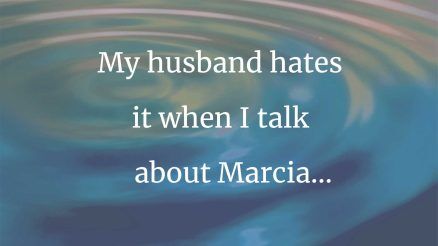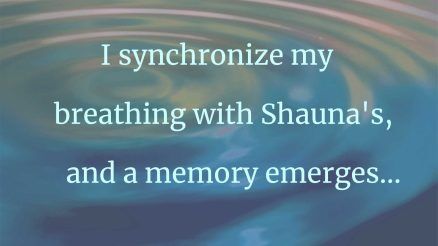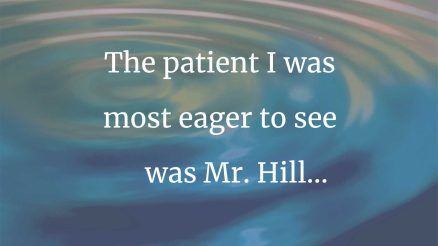Sharing personal experiences of giving and receiving health care A premier narrative medicine and medical humanities resource
Sharing personal experiences of
giving and receiving health care A premier narrative medicine
& medical humanities resource

Marcia Must Exist
Marcia doesn’t know how to ride her bike very steadily. She is afraid of swimming in the ocean and has been known to proudly announce that she’s “not a math person.” But rest assured, she has positive qualities as well.
Her friends describe her as one of the sweetest people they know, and she loves to cook. She’s not the world’s most amazing chef, true, but people coming into her kitchen while she cooks? No problem! She tells them how they can help, with not a hint of impatience. She also fancies herself quite intelligent; when she was growing up, her superior IQ was an item of family lore. (Her parents had it measured when she was five, after quizzing her with flashcards for six months.) The number vastly overstates her intelligence, but still, she’s not dumb.
Marcia exists solely in my head.

Good Job!
Robert holds back tears as we sit at the bedside of his wife, Shauna, who is dying of congestive heart failure. I’m a hospice social worker, and we’ve been talking about Robert’s fear of being left alone to raise their two young daughters.
“She’s the one who knows how to be a good parent,” he says. “I’ve always just followed her lead. I’ll be lost when she dies.”
I nod, acknowledging his pain and fear. “What would she say to you about that, Robert?”

A Patient’s Gift
“Thank you for these past couple of days.”
A simple sentence, yet one that forever changed my perspective on end-of-life care.
A faint beeping noise echoed in my room as my eyes slowly opened; it was 5:00 AM. I glanced out my window. The sun had yet to rise, but the darkness and silence were comforting in their own way. After breakfast, I got ready and headed out to the hospital where I was doing my residency training in family medicine.
The crisp morning air woke me up, and the drive to the hospital was no different from usual. Little did I know that the rest of the day would show me what it truly means to be a physician.
More Voices
Every month readers tell their stories — in 40 to 400 words — on a different healthcare theme.
New Voices
Stories by those whose faces and perspectives are underrepresented in media and in the health professions.
The Distance Between
I was in secondary school in Nigeria when I first noticed the lesion on Uncle Eze’s lip. Like many men of his age in Lagos, he’d picked up smoking in the 1980s, when foreign cigarette companies flooded our markets with glossy advertisements and promises of sophistication. The habit stuck, even as the glamour faded. The streets of Lagos were dotted with tobacco vendors then, selling single sticks to businessmen who’d made cigarettes part of their daily routine.
“It’s nothing,” he said, when I pointed to the growing sore. In those days, seeing a dermatologist meant traveling to one of the few teaching hospitals in the country. Uncle Eze, my mother’s eldest brother and the owner of a thriving electronics shop, had his business to run, customers to meet. The lesion could wait.
“Teach to Fish for Tomorrow”
It’s a typical Friday night in New Orleans. The streets are brimming with people from all over the world looking for a night of fun in the Big Easy.
I check the time: 5:45 pm. It’s a little more than a mile from my apartment to Ozanam Inn, a shelter for the unhoused where I work as the coordinator for the student-run Tulane Tuberculosis Screening Clinic Program. My shift tonight runs from 6:00-8:00 pm.
A Different Kind of Different
Editor’s Note: This piece was a finalist in the Pulse writing contest, “On Being Different.”
Every parent likes to think their child is one in a million. What if you’re the parent of an individual who is more like one in 326 million?
Society in general has started to be more cognizant of disabilities—some disabilities more than others. For instance, Down syndrome awareness and acceptance has excelled in the past several years, and schools have made efforts to teach inclusion and acceptance of students with special needs.
Poems
On Attempting Containment
R said when he heard the words
aggressive prostate cancer,
he heard location, containment, intruder
confined within hard boundaries,
not parsing each loaded syllable
as its own explosive detail
capable of spreading.
A Dance of Love
Like a rose
The nurse says
Of this new, unexpected opening into my body,
Fastening the pouch with expert hands
Deep red
Inside out
My hands tremble as I empty my
lunch of meatloaf and mashed potatoes
Rendered brown murky liquid
Into the toilet.
Wet skin
My mother doesn’t think she’s dying,
but she’s in the ER for the third time
in less than three months while
I’m 2,500 miles away on an island
in the middle of the sea, my sister
sitting with our shrinking mother
Haiku
- Jimmy Pappas
- 11 July 2025
a quick glance LATEST
- Nitu Yumnam
- 27 June 2025
first cries
- Michael J. Galko
- 13 June 2025
so many scrubs
- Ron Scully
- 30 May 2025
after all this grief
- Michael Leach
- 16 May 2025
a nursing assistant
- John Pappas
- 02 May 2025
sweet sixteen
Visuals
- Lisa S. Gussak
- 04 July 2025
Threading the Needle LATEST
- Alyssa Rogers
- 20 June 2025
Gross Anatomy Green
- Barbara Kaufmann
- 06 June 2025
Fragments
- Taina Flowers
- 23 May 2025
When the Levi Broke
- Vanessa A. Hortian
- 09 May 2025
Are We Getting A-Head of
- Crystal Letters
- 25 April 2025
